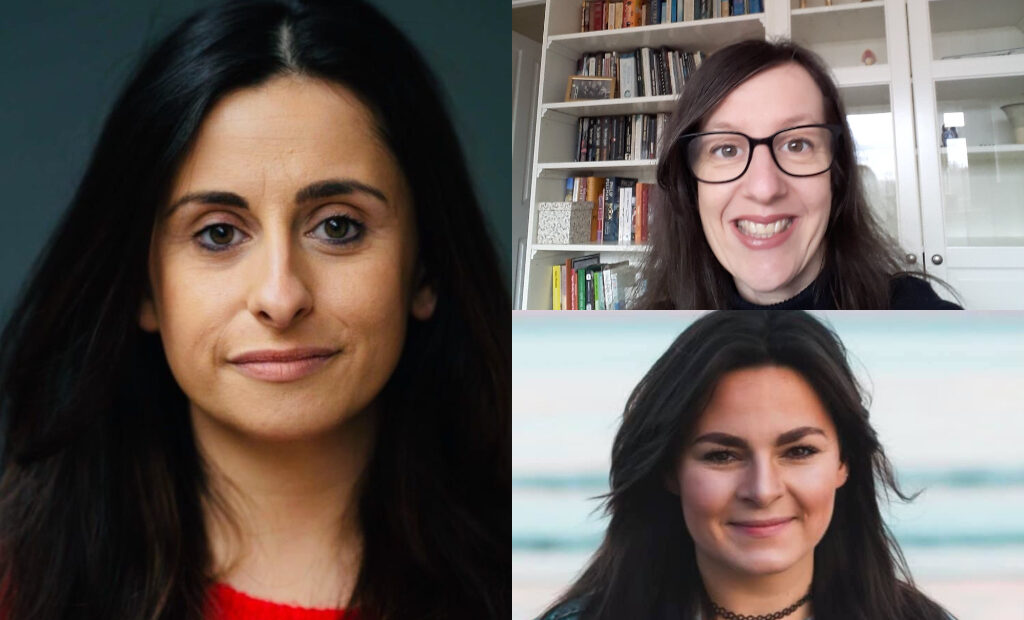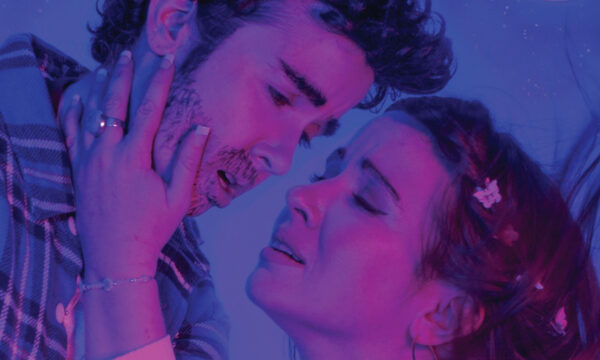Better in Person: An interview with writers Zoe Iqbal, Rachel Hogg and Shannon Barker

Burn Bright theatre company are back with a digital anthology series, Better in Person, exploring the Northern experience during lockdown this winter. The North has been hit by harsher COVID restrictions in an increasingly divided Britain, and the group was keen to platform these experiences in a thought-provoking digital theatre experience. Partnering with acclaimed local venues, they have commissioned five Northern writers who identify as women. The five plays, written for and set on a Zoom call, will be livestreamed on Monday 14th December at 8pm. We spoke to Zoe Iqbal, Rachel Hogg and Shannon Barker, three of the writers involved in the project, to find out more.
What message do you hope people will get from Better in Person?
Rachel Hogg: I hope people will see themselves and their various lockdown situations reflected in the plays and perhaps feel a sense of camaraderie.
Shannon Barker: That face-to-face conversations are not to be taken for granted. But also, that we’re lucky to be able to still have these conversations, thanks to the technology that we have.
Zoe Iqbal: That diversity in writing and storytelling is a win-win! There are lots of exciting voices in the North as well as everywhere else. Let us represent ourselves and don’t tell us how we are supposed to be.
What motivated you to join the project?
RH: As well as providing a platform for women writers, the project also explores a new way of presenting accessible theatre, which I hope is something that will be with us for a long time to come, even once the current restrictions are lifted.
What kinds of stories does Better in Person tell?
RH: Better in Person tells the story of the UK in lockdown – real stories about real situations. Ultimately, I hope that it gives audiences some entertainment, or food for thought. If someone recognises themselves in one of the plays, then hopefully it will give them a sense of “belonging,” and realise that they are not alone in their situation.
SB: It tells relatable and truthful stories, and I hope the audience will take joy from them as well as the strength that we’re all in this situation together.
How did you source your story?
RH: I wanted to write something lighthearted and humorous as an antidote to COVID. The idea for the story came from my mum’s reaction to being told that she was “old,” and my experience of the elderly being far from what we see portrayed in the media. My grandpa was 95 when he died and was full of life until the end. It is possible to be over 70 and still have a fulfilling life, in spite of what the government might have us believe. As a person with a disability, I have also found myself put in a certain “box.” People have preconceived ideas about what you can and can’t achieve.
SB: I decided I wanted to do a lighthearted comedy piece after brainstorming things that can go wrong over a Zoom call, such as technical difficulties. That led me to think about how the piece could be visually comedic, especially if the conversation is being had through a phone screen.
Is your story based on your real experience?
ZI: Partially. It’s inspired by me and my sister’s relationship, but also my best friend. Two of the wild things that happened in my play I actually did do!
Did you connect with the other writers in some way?
SB: I haven’t met any of the other writers as we’re all based in different locations, so I’m very excited to see their pieces!
Why was it important to help develop female voices in the theatre?
RH: Theatre is a platform for education, understanding and fuelling discussion. Sadly, there are many situations in this world where females remain oppressed. It’s important that there are female voices out there providing the female narrative. Everyone should have the opportunity to tell their story.
SB: Female voices can be overshadowed in the industry, and we need to change and challenge that.
ZI: To re-address the imbalance. Storytelling only gets better and better the more diverse voices there are. Female stories are human stories.
What is the “reality of the North” during lockdown and why is it important for people all over the UK to hear it?
RH: Coronavirus and lockdown have highlighted inequalities in all areas of life within the UK, from the rich/poor divide, to old/young and disabled/non-disabled. It has highlighted the North/South divide. As I sit writing this, looking out over the open fields of East Yorkshire, I wonder why I am in Tier 3, unable to return to my job in the theatre, while my London contemporaries have been awarded Tier 2 status. I lived in London for 20 years and could never really understand why Northerners bemoaned the “London-centric” nature of the UK. I now find that East Yorkshire doesn’t exist. We have been referred to as “the Humber Region,” the North Humberside title having been dropped back in 1996. It has become clear how out of touch the central government is with the North.
ZI: The reality is that there are different rules for different people. If the government can manage us with lower standards than their more favoured areas then, believe me, they can do it to anyone. I feel like we should have locked down way earlier than we did. So many haven’t had any support at all. I appreciate some have been ok but not everyone has. In the North, we do pull our socks up and get on with it; we are a welcoming people. That’s why it kind of hurt when they went for Andy Burnham and treated us differently than they did London. The government’s job is hard, but giving contracts to your mates from down the pub and then not fully supporting many workers is not ok.
How are online conversations showcased in Better in Person?
RH: Because all the conversations take place via Zoom, there is a real sense of the audience as voyeurs, peeking in at the private lives of the characters. There is an intimacy to the plays that perhaps can’t be achieved in live theatre.
How do you think the pandemic has affected the way you work as an artist?
SB: There’s a lot more reliance on technology, which can make some performances more accessible, but other aspects such as rehearsals more difficult. It’s opened new opportunities though as people are reaching out to collaborate via the Internet. It’s building my skills to be more adaptable and to think outside of the box when being creative too.
ZI : It has made me appreciate the many ways of storytelling, and even look at online shows of places I don’t usually visit due to location.
Do you think using mediums such as Zoom will continue after the lockdown as a way of making the theatre more accessible?
RH: I really hope this is the case. I think technology has really come into its own during the pandemic.
SB: I think it could, yes. But it wouldn’t necessarily work for those who enjoy the whole experience that theatre brings. It may be interesting to see if the use of Zoom could lend itself to interactive theatre pieces.
ZI: Only until something even better comes along. It’s impressive how Zoom has been used and how it enables more people to be involved. Bravo to everyone experimenting with bringing theatre to everyone!
What do you hope 2021 will bring for theatre?
RH: I hope people will appreciate theatre more once we are allowed back into live performance venues. A theatrical renaissance, perhaps? At the same time, I hope that venues don’t turn their back on the online world. Projects such as Better in Person have shown how theatre can be accessible and affordable to those who may find it difficult to get to the theatre in person.
SB: I’m hoping it will bring exciting new projects that will be fuelled by passion, as so many people have been missing out on theatre for a long time this year. And hopefully theatre won’t be forgotten about, as I believe people have realised how important it is for society and community.
ZI: People from minority backgrounds being able to tell their own stories from their own perspectives, but also not being forced to make work about their own background if they don’t want to. I would love more diversity. I’d love to have conversations with all the people I don’t agree with, find common ground and look at the tricky areas. I want escapism and anime/folklore fairy tales, but I also want activism, one-woman shows, shows from places I have never been, and local talent telling it how it is. I would love more Manchester stories from local Mancunians, but also communities who have settled in the city. I’d like some plays that challenge the status quo and injustices in our society. I want some bad-bitch energy coming through and more badass females supporting each other and reaching for the stars. More I May Destroy Yous, Fleabags, Death of Englands coming through. Realness.
Sophia Moss
For further information about Better in Person and Burn Bright visit here.


























Facebook
Twitter
Instagram
YouTube
RSS